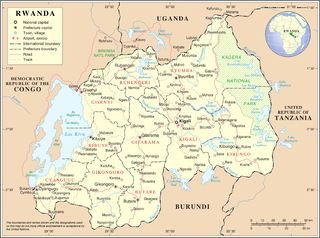
The United Nations Economic Commission for Africa was established in 1958 by the United Nations Economic and Social Council to encourage economic cooperation among its member states following a recommendation of the United Nations General Assembly. It is one of five regional commissions.

The African Court on Human and Peoples' Rights, also known simply as the African Court, is an international court established by member states of the African Union (AU) to implement provisions of the African Charter on Human and Peoples' Rights. Seated in Arusha, Tanzania, it is the judicial arm of the AU and one of three regional human rights courts.

The individual member states of the African Union (AU) coordinate foreign policy through this agency, in addition to conducting their own international relations on a state-by-state basis. The AU represents the interests of African peoples at large in intergovernmental organizations (IGO's); for instance, it is a permanent observer at the United Nations' General Assembly.
The following lists of presidents are available:

The Special Committee on Peacekeeping Operations of the United Nations, or C34, is a committee of the United Nations General Assembly. It focuses issues relating to peacekeeping.
National records in athletics are the marks achieved by a nation's best athlete or athletes in a particular athletics event. These records are ratified by the respective national athletics governing body. A national record may also be the respective continental record, or even the world record (WR) in that event.

United Nations Security Council resolution 977, adopted unanimously on 22 February 1995, after recalling Resolution 955 (1994) in which the council was to determine the seat of the International Criminal Tribunal for Rwanda (ICTR) and noting a report by the Secretary-General Boutros Boutros-Ghali, the council decided that its seat would be in Arusha, Tanzania.

United Nations Security Council resolution 1200, adopted unanimously on 30 September 1998, after recalling resolutions 955 (1994), 989 (1995) and 1165 (1998), the Council forwarded 18 nominations for judges at the International Criminal Tribunal for Rwanda (ICTR) to the General Assembly for consideration.

United Nations Security Council Resolution 1932, adopted unanimously on June 29, 2010, after recalling resolutions 955 (1995), 1165 (1998), 1329 (2000), 1411 (2002), 1431 (2002), 1717 (2006), 1824 (2008), 1855 (2008), 1878 (2008) and 1901 (2009) on Rwanda, the Council noted that the 2010 target for the completion of trials at the International Criminal Tribunal for Rwanda (ICTR) could not be met, and therefore extended the terms of 16 judges at the ICTR.

United Nations Security Council resolution 1449, adopted unanimously on 13 December 2002, after recalling resolutions 955 (1994), 1165 (1998), 1329 (2000), 1411 (2002) and 1431 (2002), the Council forwarded a list of nominees for permanent judges at the International Criminal Tribunal for Rwanda (ICTR) to the General Assembly for consideration.

An Interpol Travel Document is a travel document issued to Interpol officers for travel to Interpol member countries. They are intended to reduce response times for personnel deployed to assist with transnational criminal investigations, major events or emergency situations by waiving normal visa requirements.

United Nations Security Council Resolution 1613, adopted unanimously on 26 July 2005, after recalling resolutions 827 (1993), 1166 (1998), 1329 (2000), 1411 (2002), 1431 (2002), 1481 (2003), 1503 (2003), 1534 (2004) and 1597 (2005), the Council forwarded a list of nominees for temporary judges at the International Criminal Tribunal for the former Yugoslavia (ICTY) to the General Assembly for consideration.

United Nations Security Council Resolution 1717 was adopted unanimously on October 13, 2006; after recalling resolutions 955 (1995), 1165 (1998), 1329 (2000), 1411 (2002), 1431 (2002), 1449 (2002), 1503 (2003) and 1534 (2004) on Rwanda, the Council extended the terms of temporary judges at the International Criminal Tribunal for Rwanda (ICTR).
The Association of World Election Bodies, commonly referred to as ‘A-WEB’, was established on October 14, 2013 in Song-do, South Korea. A-WEB is the first global organization of election management bodies, and the membership currently consists of 118 EMBs as members and 20 Regional associations as associate members. Under the slogan of ‘Democracy to Grow for All Worldwide,’ the A-WEB Secretariat provides training programs for election officials of member nations and undertakes country programs at the request of member organization, providing support during the election cycle to boost election management capacity. The current chairman is Mosotho Moepya from South Africa.










